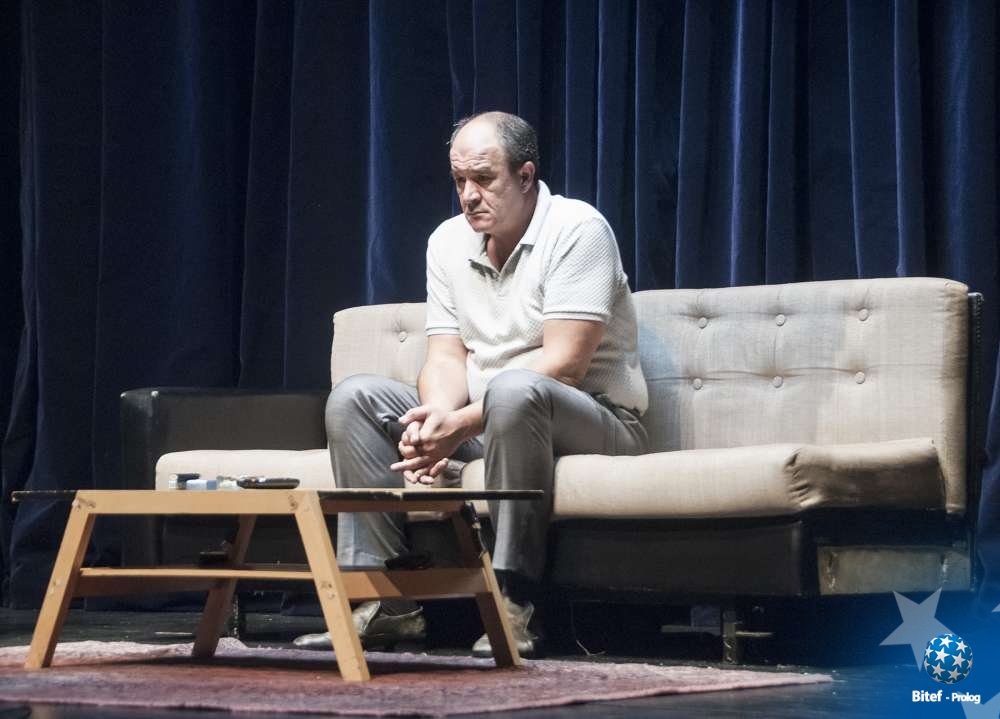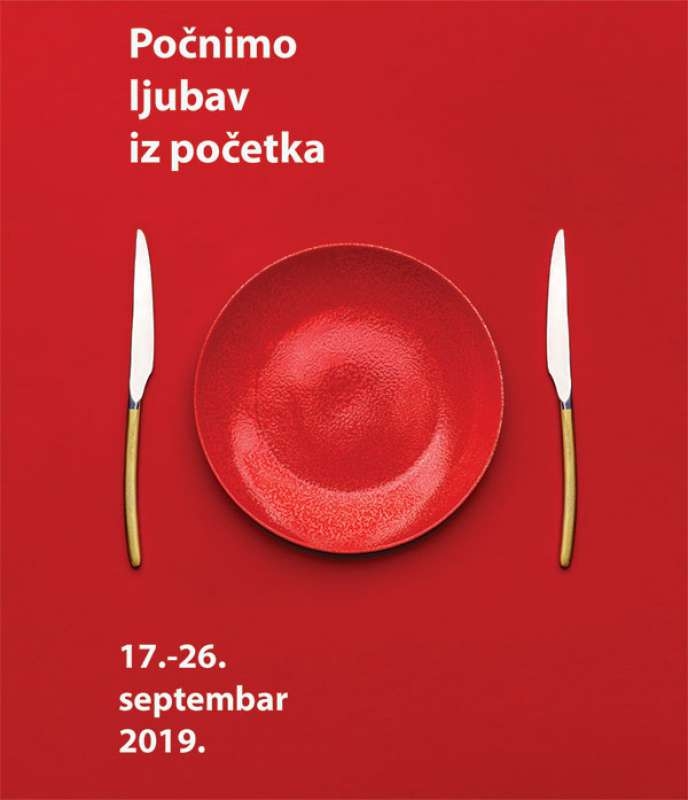- Who do you think are the guilty ones for a crime one individual commits? In an alternative reality, could we, as a society, prevent Herr R.’s excess? Can we, and up to which point, see Herr R. as a tragic hero of the present moment?
Whoever commits a crime is the guilty one, there’s no doubt about that. Anything other than that wouldn’t be good, especially in this region. Especially after the wars and post-wars, as we like calling the contexts and the emotional states we live in. But your question is probably more about the climate in our countries, about the responsibility that a society has for an individual, not about the mechanisms that lead to that. Actually, the mechanisms that should lead to that, because nothing has been institutionalized in that respect - everything usually just comes down to unions or social services, countable and solvable by numbers. And, of course, various forms of self-helps, new-age meditations, psycho-treatments, and similar approaches. One does what one can. Society relies on mantras, one of which definitely is the individual and the family; while the very same society has no remedy for those situations when everything about that individual and his family goes to hell, when there’s no help… Not even does an awareness that it should be done remain, not even public speaking about it, or anything institutionalized. I am not talking about vulnerable groups, but about the “normal” ones - about us. Herr R. is thus more of a warning or an outcry, a scream, an alarm, he’s more that than a traditional character in a costume, who came out of a dressing room wearing an appropriate makeup. He is a raw material who should be recognized as a danger. He’s more of a thesis than a lifelike creature, and yet, he’s more real than life itself, more argute that a character from the so-called psychological realism. He’s powerful in the negativity he radiates. He is not an embodiment of evil, he’s not evil, nor is he good or generous, he’s simply average and, what can bother us most - normal. The film which N. Govedarica and I used as the starting point for the dramaturgy of the performance is clear, sharp, insanely precise in its intention to say what has to be said, and what many can’t see because it’s hard to be seen.
- The concept of family seems almost unsustainable in the modern world, and young people keep postponing it or reject the possibility of family as a sustainable form of unity altogether. What do you see as the challenges that contemporary family faces, and did you in your work on this performance have an inspiration in family that you could share with us?
Statistically speaking, I don’t know to which extent young people reject traditional marriage or at least traditional way of entering it, I think that depends on regions, on states. For example, I know that young people in Bosnia and Hercegovina are exceptionally tuned in to everything linked to traditional values, which also means marriage and family issues, especially in the past couple of years. Young generations are infected by everything that took place in these regions in the past years, especially by right-wing politics, so that attitude obviously has its consequences. Still, if we talk about the notions of marriage and family today, we have to revise their meaning, roles, practices, etc. In terms of safety, warmth, but also in terms of coercion, manipulation, and fake moral. That’s the area where we found motifs for our performance. In Croatia, the referendum for or against gay marriages was troublesome, because some, rather political groups that, seemingly protecting traditional values, were actually monopolized and abused the role of the family nowadays, its meaning and function. The results were devastating.
- In one of its dimensions, Why Does Herr R. Run Amok? is set in the 70ies of the 20th century, in West Germany, but anachronously, the well-known voice from the present-day LCD TV enters that past. How did you create the links between the 70ies and the present?
In theatre today, you don’t have, or rather, it’s pointless to talk about realism of an outdated kind, the kind which implies that it’s not possible for all sorts of things to take place, therefore also to have a link between realisms from two moments in time. The significance of the voice coming out of TV wouldn’t be the same. Had I decided to play the speech by the German Chancellor at the turn of 60ies and 70ies - who, by the way, was Willy Brandt and everything that is linked to his era - and keep it consistent, respecting the time setting of the story, instead of the voice of the current Serbian president and the phrases we have all gotten used to, it wouldn’t be the same. The scene remains the same but the speech gains in significance and clarity, and so does the protagonist’s inclination. So, we emphasised one element, we made it more accessible and closer to us now. I communicate with people who live today and who, most of them I presume, haven’t heard of Willy Brandt, so I have to establish communication with them in a very short time. That way, theatre realism gets more comprehensive than any realism, i.e. it becomes specific - it turns into a meta-language that is allowed only in theatre.
- Why Does Herr R. Run Amok? abounds with meta-theatre moments and one can somehow feel the importance of its being a theatre performance, even via the title which exists on two planes - the front one that is collapsing, and the back one which points out at the importance of the performance for the society. How do you see the role of theatre, and how the conflict between the two spaces that you offer to us in the performance by keeping us, for a while, in front of the curtain, and yet letting us see the depth of stage from time to time?
The attitude towards the past, that’s what’s back there, the backdrop and the rubbish and the rejected objects suggest the phases in our recent history, while at the same time they suggest a look towards the future, towards the audience that is constantly being asked for something. At least for understanding or consolation, but which offers nothing but silence, so the conflict, as you called it, is actually a man’s common attitude towards the things he knows, things that make him who he is, and the things that are yet to come. Especially a man like Herr R., the one who has aggressively rejected the past and is obsessively looking towards the future, expecting it to fulfil him and let him have what he thinks he has deserved.
- The dominant sentiment is that the performance is very clear, especially in a way that you’ve staged it so that all the elements support the dramatic situation (as for example the rigging that drops the lights onto Herr R. who has already burnt out) and it seems that, aside from the mentioned meta-theatre, the recipients remain within the story. Could you tell us a bit more about the cooperation with the actors? All of them are brilliant and the result suggests that the cooperation was great.
What can I tell you about it in a couple of lines? It’s a complex thing, the process, and the result is, you agree, simple. Or at least that’s how it seems. I don’t accept that any work in theatre can exist without an auteur, artistic competence, and that includes actors. I set off from a basis, for e.g. the reasons for an action, or simply put, from the motif. My own motif, but also the fictional one, the one that motivates the character, the one that actor is interested in. That approach creates a common ground, a starting point where we should all understand each other, and where we have created a position from which actor can act during the process. It gives him the stability he can return to whenever he needs to use it, or when he improvises, or when we consciously try to negate it, which is also a part of the process. In the end, it offers him the freedom to act, and sometimes, as you say, to be brilliant.
- The same day that your performance played at Bitef, there was also the presentation of Norman Ohler’s book Blitzed: Drugs in the Third Reich. Have you read it, and can you notice some new forms of drugs for masses?
Unfortunately, I haven’t, but I hope I will, soon.
- How do you think would be possible to start love over in the present moment?
If we started with flirting, an invitation to dance, then escorting back home, then setting up another date for the next day, a slow warm-up and thinking about the certain person - then we might start it over. Both sides must have an interest, no matter how concealed it might be.

